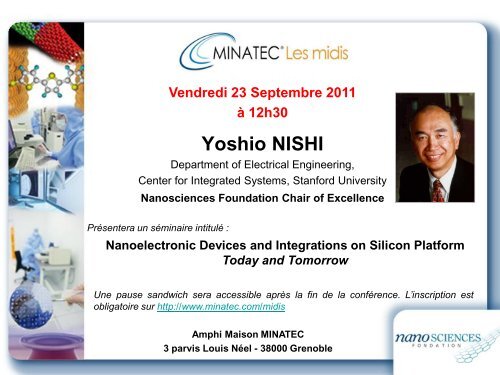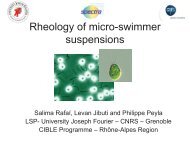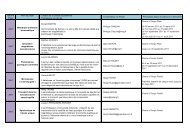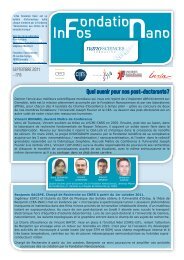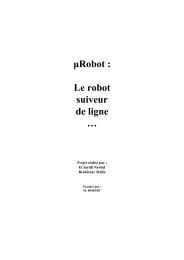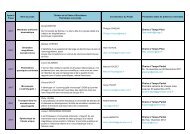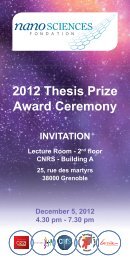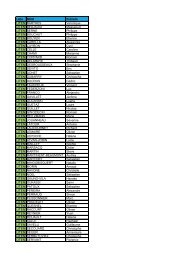Yoshio NISHI - Fondation Nanosciences
Yoshio NISHI - Fondation Nanosciences
Yoshio NISHI - Fondation Nanosciences
Create successful ePaper yourself
Turn your PDF publications into a flip-book with our unique Google optimized e-Paper software.
Vendredi 23 Septembre 2011<br />
à 12h30<br />
<strong>Yoshio</strong> <strong>NISHI</strong><br />
Department of Electrical Engineering,<br />
Center for Integrated Systems, Stanford University<br />
<strong>Nanosciences</strong> Foundation Chair of Excellence<br />
Présentera un séminaire intitulé :<br />
Nanoelectronic Devices and Integrations on Silicon Platform<br />
Today and Tomorrow<br />
Une pause sandwich sera accessible après la fin de la conférence. L’inscription est<br />
obligatoire sur http://www.minatec.com/midis<br />
Amphi Maison MINATEC<br />
3 parvis Louis Néel - 38000 Grenoble
Nanoelectronic Devices and Integrations on Silicon Platform<br />
Today and Tomorrow<br />
There is widely shared concern today that as we approach future technology nodes of CMOS<br />
beyond sub-20nm, diminishing return in device performance and density combined with<br />
serious increase in on-chip power consumption would force us to seek for possible<br />
alternatives beyond simple scaling of the minimum geometry.<br />
Applications of mechanical strain to MOSFET channel for improved transport characteristics,<br />
material alternatives for conductive channel of MOSFET such as germanium and/or III-V<br />
semiconductor, intensive study for partial replacement of on-chip interconnects with optical<br />
interconnect, new nonvolatile memory phenomena thereby feasibility of new memory devices<br />
such as resistive switching are only a part of such efforts in addition to global trend of going<br />
3D devices and integration. Also mentioned should include a variety of “nano” materials such<br />
as carbon nanotube, graphene, topological insulator etc, which might capture unique positions<br />
in integrated circuit technology arsenal with further in-depth understanding and technological<br />
break-through for controlling their characteristics.<br />
This talk will discuss a perspective of a variety of nanoelectronic devices to be integrated on<br />
silicon platform, and where they would likely be heading toward.
Biography of <strong>Yoshio</strong> <strong>NISHI</strong><br />
<strong>Yoshio</strong> Nishi received BS in material science and PhD in electronics engineering from<br />
Waseda University and University of Tokyo, respectively. He joined Toshiba R&D Center<br />
where he studied silicon process technology and MOS device physics, resulting in a variety<br />
of achievements including discovery of Si-SiO2 interface paramagnetic PB center, the<br />
structural origin of interface states.<br />
Later he led the development of the world first 1Mbit CMOSDRAM, 16bit SOS<br />
microprocessor. He joined Hewlett-Packard Laboratories in 1986 as director of silicon<br />
process laboratory for high performance CMOS R&D, followed by joinning Texas Instruments<br />
as senior vice president and director of R&D in 1995. Since 2002 he has been professor of<br />
electrical engineering, Stanford University, where he serves as director of research for Center<br />
for Integrated Systems, director, Stanford Site of National Nanotechnology Infrastructure<br />
Network.<br />
His research activities cover resistive switching nonvolatile memory, high performance<br />
alternative material channel MOSFETs, Ge and Si optical transmitter and graphene research.<br />
He published more than 250 papers and conference presentations and hold more than 50<br />
patents in Japan and US. He is IEEE Fellow, and recipients of 1995 IEEE Jack Morton<br />
Award, 2002 IEEE Robert Noyce Medal, 2007 Technology Management award, 2008 SEMI<br />
Lifetime achievements award.<br />
<strong>Yoshio</strong> <strong>NISHI</strong><br />
Email: nishiy@stanford.edu


